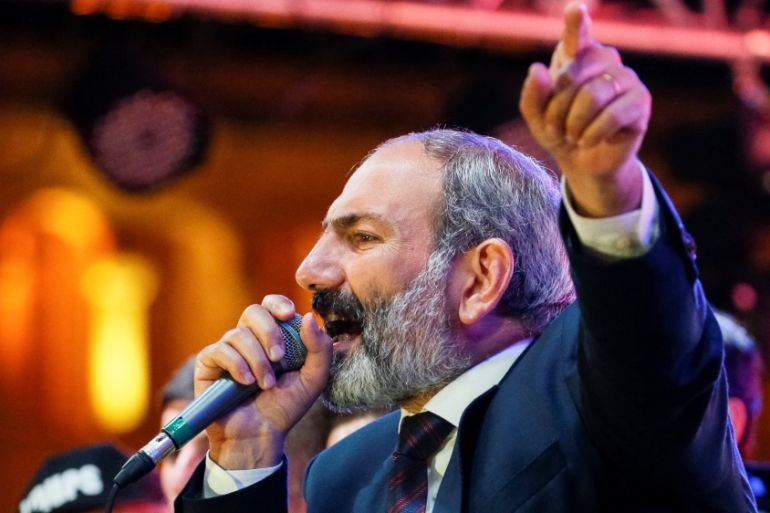Who is Armenian opposition leader Nikol Pashinyan?
The 42-year-old opposition leader has mobilised tens of thousands of people to protest against Armenia’s ruling elite.

Mass anti-government protests that engulfed Armenia in April drove the country into a deep political crisis for weeks under the leadership of opposition leader Nikol Pashinyan.
Protests and marches initially took place in response to former president Serzh Sargsyan’s appointment as prime minister of Armenia, making him the most powerful figure in the government.
The demonstrations then focused on the Republican Party-controlled government in general and drew tens of thousands of people every day. Pashinyan declared it a “velvet revolution”.
The protests eventually led to Sargsyan conceding, “I was wrong while Nikol Pashinyan was right,” he said when announcing his resignation.
After Sargsyan stepped down, a vote was scheduled in the National Assembly for May 1 to elect an interim prime minister.
Pashinyan had secured the support of all opposition parties and was formally nominated, but to be elected he needed at least 53 votes, which would mean at least six members of the Republican Party would have to vote for him.
After the May 1 session, which lasted for almost six hours, the Republican Party made a unified decision to vote against Pashinyan, depriving him of the majority vote he required.
This resulted in a nationwide strike and protests that immobilised the country on Wednesday.
Journalism background
Pashinyan was born on June 1, 1975, in the Armenian town of Ijevan. He studied journalism at Yerevan State University but was expelled after four years for his political activities.
During his studies, he worked as a journalist and wrote for various Armenian publications.
He was the editor of Armenia’s best-selling daily liberal newspaper, The Armenian Times, which has always been highly critical of the governments of Robert Kocharyan and Serzh Sargsyan.
In 2000, when he was chief of The Armenian Times, he was convicted on charges of defamation and libel against several people.
|
|
In 2004, Pashinyan’s car – parked just outside The Armenian Times office in downtown Yerevan – burst into flames after an apparent explosion.
Pashinyan has said the blast was an assassination attempt engineered by a wealthy businessman, Gagik Tsarukian.
Not long before the explosion, Pashinyan’s newspaper published a story that accused Tsarukian of illegally cutting down trees to build a villa in an Armenian resort town.
The police concluded, however, the car fire was caused by a “breakdown of the car battery’s wires”, and denied Pashinyan came under attack.
‘March First’
In March 2008, a series of mass protests were held in Armenia in the wake of the presidential election on February 19, 2008.
Supporters of the unsuccessful presidential candidate and first president of the Republic of Armenia, Levon Ter-Petrosyan, organised mass protests against alleged electoral fraud.
After 10 days of protests, the military and police tried to disperse the protesters on March 1, using truncheons and electric-shock devices. Ten people were killed and more than 100 opposition activists arrested.
The tragic events of March 1, 2008, are referred to as “March First” in Armenia.
Pashinyan, who took part in the 2008 protests in support of Ter-Petrosyan, went into hiding shortly after the deadly unrest. He was wanted by the police on allegations of murder and mass disorder.
In June 2009, he came out of hiding and turned himself in to the authorities.
He was released after two years when amnesty was granted to many political prisoners in May 2011.
Political ascension
In 2012, he was elected to the National Assembly of Armenia and is the leader of the opposition party Civil Contract, as well as the liberal Way Out Alliance.
Way Out is a merger of Civil Contract, Bright Armenia, and Republic political parties that together form the opposition in Armenia’s parliament. It has nine out of 105 seats in the National Assembly.
In 2017, he ran for the post of mayor of Yerevan but came second with 21 percent of the votes.
Pashinyan is married and has four children: three young daughters and an 18-year-old son. His wife, Anna Akopyan, is the current editor-in-chief of The Armenian Times.
The 2018 anti-government protests were staged by various political and civil groups led by Pashinyan, which are most commonly known by the slogan Merzhir Serzhin, or Reject Serzh.
As the National Assembly failed to elect a new prime minister during the May 1 session, despite Pashinyan being the only candidate, a second vote will be held a week later.
The National Assembly will be dissolved and elections called if the second vote fails to produce a new prime minister.